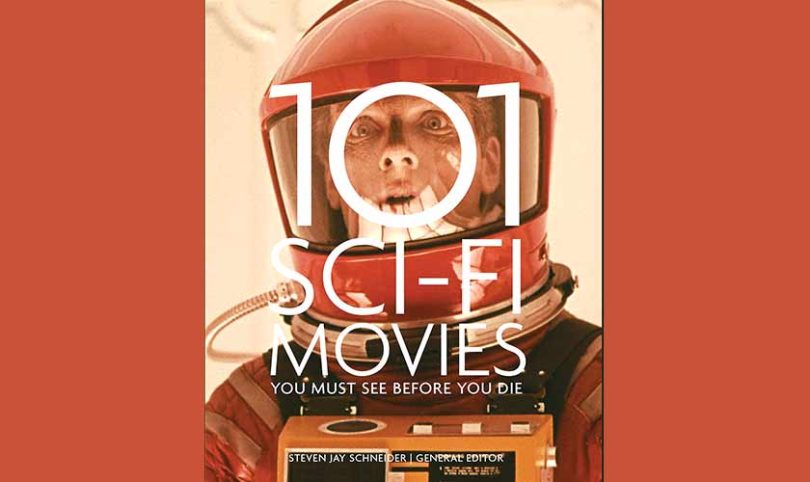Omair Alavi|Instep|October 4, 2020
Edited by Steven Jay Schneider and written by a team of respected film critics, 101 Sci-Fi Movies You Must See Before You Die, is a treasure trove of the science fiction genre and essential reading for cinema fans at large.
From Stanley Kubrick to Steven Spielberg to films like The Matrix, this book covers the best of sci-fi in terrific fashion.
Christopher Nolan’s Tenet has released in select countries and those who have seen the film swear by it. Some even claim that it is amongst one of the best science fiction (sci-fi) films of all-time. However, not many people would be able to tell you about top science fiction films to date and what are some of the other films whose ranks Nolan’s Tenet has just joined. To make things easier for you, we recommend you peruse the book, 101 Sci-Fi Movies You Must See Before You Die.
Edited by Steven Jay Schneider and written by a team of respected film critics and reviewers, this book is a treasure trove of science fiction films released in the last 120 years. To simplify the list, the author has placed the films in chronological order so that the first film in this book is A Trip To The Moon (1902), followed by similar feeble attempts until science fiction truly evolved with Metropolis in 1927.
If you didn’t know that the first version of The Invisible Man was made in 1933 or that the earliest alien movie was attempted with The Thing from Another World (1951) and that time traveling first took place in cinema before Back To The Future (1985), don’t worry; this book has it all covered. Many details about the evolution of the science-fiction genre and what were some of the films that made that first odyssey are mentioned here. It will make you fall in love with sci-fi, if you aren’t already a fan of the genre.
Where else would you get a full-page image of either the poster of the film or a still from the movie accompanying the plot summary, a list of cast and credits as well as interesting notes about the production? It’s true that the genre evolved with time, but some movies from the 1950s and 1960s still seem ahead of their time, and this book mentions them with the respect they deserve.
From the original The War of the Worlds (1953) to the original Godzilla (1954) or everyone’s favourite: 20,000 Leagues Under the Sea (1954) and the very advanced features such as Forbidden Planet (1956), Journey to the Center of the Earth (1959) and the first The Time Machine (1960), everything you need to know about these films can be found within these pages.
But it isn’t just the names of the films that are mentioned; things like what changes did the creators go for that irked the authors – if a film was an adaptation – and what made a film unique to be on this list is also delved into in concise fashion. Among the many reasons why this book is gold is the information it covers. For example, Steven Spielberg is one of those directors who have kept the sci-fi genre interesting for the audience. Most of his films, ranging from Close Encounters of the Third Kind (1977) to Minority Report (2002) also make it to this very well-researched book.
Similar is the fate of prominent science fiction directors including Sir Ridley Scott, John Carpenter, James Cameron and Christopher Nolan. Don’t be surprised to find some non-American movies here because some of the best sci-fi movies were made in other countries.

Tenet, the newest film by Christopher Nolan, has been ranked as one of the best sci-fi films made, period.
And yes, since the book is targeting a younger demographic and not only old-school fans, there are also films like Independence Day, The Matrix, and some (relatively) recent films that have stood out due to their technological advancements or interesting storylines and in some cases, both.
The book doesn’t just provide unknown information on good sci-fi films but also other things including how Woody Allen once tried directing a film in the genre; films such as the now-forgotten Flash Gordon and Robinson Crusoe on Mars. You’ll also find a synopsis of the original Westworld (1973), which is the same as Jurassic Park (1993) and was written by the same Michael Crichton. What made the first Planet Of The Apes (1968) a smash hit? It also covers Star Trek and Star Wars and covers facts such as who was the actor cast before Michael J. Fox owned Marty McFly? Since no science fiction collection is complete without Stanley Kubrick’s 2001: A Space Odyssey (1968) and A Clockwork Orange (1971), they are also present alongside George Lucas’ THX 1138 (1971), that was his most notable work in the science fiction genre until he changed the way films were made with Star Wars franchise.
Omair Alavi is a broadcast journalis







